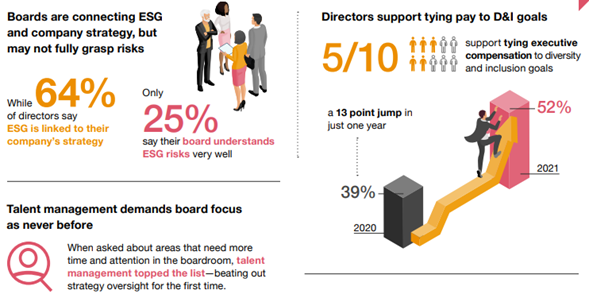Fuente: PwC Board governance Insights
Autor: PwC
PwC’s 2021 Annual Corporate Directors Survey
Revisa acá el informe en formato PDF
The director’s new playbook: Taking on change
These changes have had broad impacts on companies, from their employee base to the executive suite—and up to the boardroom. Directors are taking note, and our 2021 Annual Corporate Directors Survey reveals that they are driven to create a new playbook to take on change.
ESG and strategy: Boards start to connect the dots
Although investors have been focused on ESG for years, 2020 and 2021 thrust those issues into the spotlight in a new way. The 2021 proxy season saw more ESG-focused shareholder proposals than ever before, and those proposals received higher levels of support. Board members now report that ESG is the number one topic investors most want to discuss with directors during shareholder engagements.
In 2021 we see a real shift in how boards are thinking about and addressing ESG. Most importantly, more boards are linking ESG to company strategy. Almost two-thirds of directors (64%) now say their strategy is tied to ESG issues—a 15-point jump since last year, and a strong indicator of how quickly things are changing. More than half of directors also say that ESG is a part of risk management discussions (62%) and that ESG issues have a financial impact on company performance (54%).
But are directors equipped to oversee these complex issues? When asked about how well their board understands various areas of oversight, ESG ranked lowest. Just 25% of directors say their board understands ESG risks very well.
Boards are connecting ESG and company strategy, but may not fully grasp risks
Talent management demands board focus
One thing that we never hear from directors is that their boards have too much time and not enough to do. Directors most commonly report spending between 150 and 250 hours on their board duties. And still, board and committee agendas are packed, and deciding how to allocate time is difficult.
When it comes to which areas are most in need of more time and attention, respondents ranked talent management at the top of the list for the first time. COVID-19 and the evolution of the workplace have created a need to manage workforces in a new way, demanding more of boards’ time and focus.
Areas where directors would spend more board time
Talent management 34%
Strategy 31%
Crisis management 29%
Succession planning 28%
Source: PwC, 2021 Annual Corporate Directors Survey, October 2021
Bringing ESG metrics into executive compensation
As the ESG conversation takes hold in boardrooms, more and more companies are making changes to their executive compensation plans to reflect that focus. In part, this is a recognition that executives should be held to account for company priorities including non financial performance metrics. More than half of directors support tying compensation to goals relating to customer satisfaction, safety, quality, and employee engagement.
But a key change relates to the inclusion of D&I goals. While the vast majority of directors (86%) are in favor of companies doing more to promote equality in the workplace, last year just 39% of directors agreed that incentive plan goals should actually be tied to those metrics. In 2021, that figure rose 13 points to 52%, indicating a significant shift in how boards are thinking about D&I in particular, and how they can hold executives accountable.
Support for D&I goals grows
Macro issues impacting strategy oversight
Across the world, leaders in business, politics, and society point to a common set of concerns. Asymmetry, disruption, age, polarization, and trust (ADAPT framework) are fundamentally changing the way billions of people live and work. Because the board of directors can (and should) take the long view on company strategy, their view on these long-term pressing issues will impact how companies incorporate these issues into their future planning. Read more about these global concerns and the board’s role in addressing them here.
Board practices: directors still see room for improvement
Investors and others have focused on board composition and turnover for years, pushing boards to recruit directors who bring a diverse set of skills, expertise, and background to the board. But even so, director turnover rates remain low. For boards looking to increase their diversity and/or skill sets, many are expanding their size to accommodate new members. Are boards doing enough to ensure that each director in the boardroom is the right fit for the board? Many directors don’t think so.
Board refreshment remains a concern
Almost half of directors (47%) say that at least one fellow board member should be replaced. Eighteen percent (18%) would like to see two or more board members replaced.
And yet overall, fewer directors point to issues with their peers’ performance. A smaller percentage say that their peers are reluctant to challenge management (12%, down from 18%) or overstep the boundaries of their oversight authority (11%, down from 18%). Almost two-thirds of directors (63%) didn’t name any specific complaints at all about their peers—an 11 point increase since last year.
So perhaps the issue is less about underperformance, and more about each director being the right fit for the board.
Board refreshment/recruitment is never “done.” The board is constantly evolving and nominating/governance committees could benefit from thinking about it that way.
Directors look for change
Racial diversity drives new director searches
Recent board diversity requirements enacted in California, NASDAQ listing standards, and calls from investors have put a new emphasis on the need for boards to have not just gender diversity, but racial and ethnic diversity as well. As a result of these pressures, board searches are changing. When we asked about the single most important attribute being prioritized in the board’s next director search, racial/ethnic diversity topped the list (25%). It ranked higher than traditional areas like industry expertise (20%) and operational expertise (14%). Gender diversity ranked much lower at 12%, perhaps because boards have done a lot of work to bring on female directors in the past few years—if only one or two.
And when it comes to skill sets generally in demand for directors, boards are still prioritizing wide skill sets over narrow ones. Cyber and ESG are important issues for boards, but they are not necessarily looking for experts in those areas. A growing focus in the boardroom doesn’t translate to the need for specific expertise.
Top search criteria for new directors
Virtual board meetings take their toll
In 2020, as the COVID-19 pandemic hit, nearly all boards shifted from in-person to virtual meetings, like the rest of corporate America. In 2021, this trend has started to turn, with nearly all directors (96%) reporting that their boards will be back to meeting in person by the end of the year. But many (54%) also say that they plan to continue to meet virtually some of the time.
52% of directors say that virtual meetings are more efficient. But they also say directors are less engaged, the board is less effective, and boardroom culture is suffering.
Directors gauge the positive and negative impact of meeting virtually

Conduct better assessments to activate your board’s potential
Board, committee, and individual director assessments are a critical piece of the puzzle for boards looking to improve. To be effective, a board’s assessment process needs to be honest and thorough. Most importantly, it needs to lead to action or change.
In many ways, boards’ assessment processes today are getting high marks. The overwhelming majority of directors (88%) say their board has an effective process, and 89% give their board leadership high marks for the way assessments are led. More than three-quarters (76%) say there is sufficient follow-up afterwards.
But boards still battle some limitations. Two-thirds of directors (67%) say it is difficult to be frank in the process, and more than half (52%) say it is too much of a “check the box” exercise.
PwC’s Annual Corporate Directors Survey has gauged the views of public company directors from across the United States on a variety of corporate governance matters for more than a decade. In 2021, 851 directors participated in our survey. The respondents represent a cross-section of companies from over a dozen industries, 76% of which have annual revenues of more than $1 billion. Seventy-one percent of the respondents were men and 29% were women. Board tenure varied, but 65% of respondents have served on their board for more than five years.












